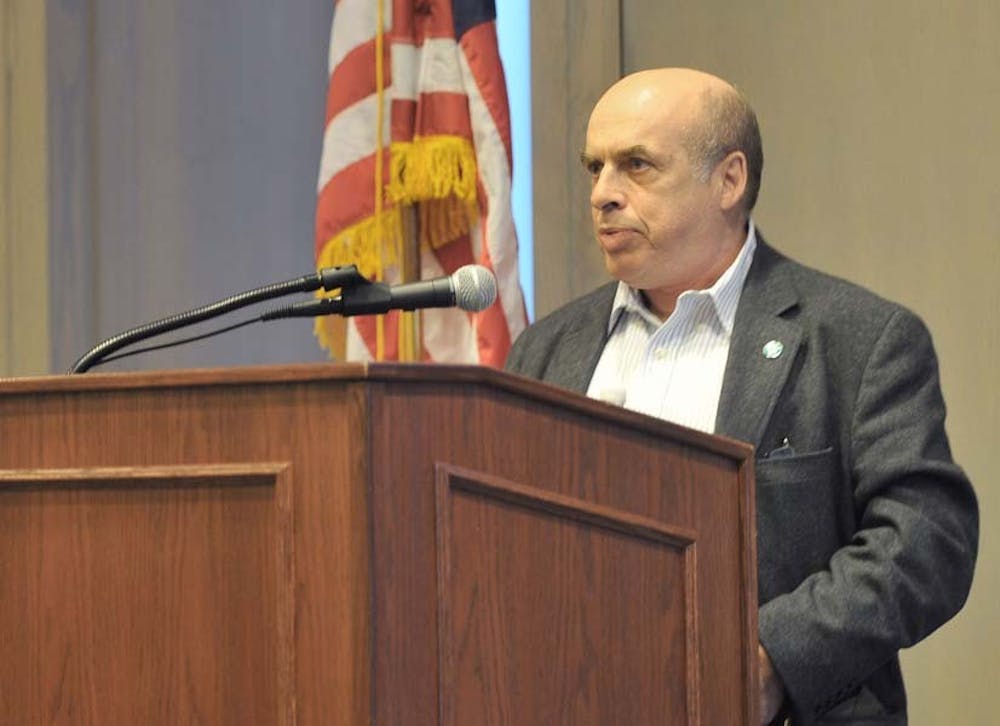In an auditorium filled with students aspiring to make an impact on the world, Natan Sharansky — a human rights activist and chair of the Jewish Agency for Israel — tried to convey his personal fight for freedom, liberty and democracy.
At Hillel on Tuesday, Sharansky delivered a lecture on what he called his rise “from hell to paradise.”
He began by describing his childhood memories in the Soviet Union where he grew up with no knowledge of his Jewish identity or roots. However, after feeling the brunt of Soviet oppression for his Jewish identity — especially after Israel’s defeat of Soviet-sponsored Middle Eastern countries in 1967 — Sharansky began contemplating his roots.
During this time, he sought to become “part of the unique, old history of Judaism” and connect to the history, people and state of Israel, he said.
By meeting with Israeli tourists in Russia, Sharansky slowly pieced together his identity and began to feel a strong desire to leave his Soviet homeland for Israel.
While still in Russia, he became involved in both Jewish and human rights groups and became the spokesman for the Moscow Helsinki Group — a non-governmental human rights organization.
By demonstrating in the heart of Moscow, Sharansky and only a few others influenced thousands of activists around the world to rally for the freedom of Soviet Jews.
The story of Sharansky’s fight for universal and Jewish rights impacted College sophomore and Penn Friends of Israel Co-President Jacob Ruden.
Related
3/27/2013: J Street U Penn Executive Board | A crucial voice for Israel
3/21/2013: Moral Voices hosts Sudan activists
He said that Sharansky highlighted “that Jewish rights and universal rights are not in contradiction, and that Israeli values and liberal ideals can work together.”
College freshman Nick Zarra was inspired by Sharansky’s fight for freedom and liberty. Sharansky taught him that “for all people, Jews or non Jews, democracy and liberty matter.”
In 1977, Sharansky was arrested by the Soviet KGB and sent to a prison camp in Siberia. He said that he was able to withstand the oppressive conditions of prison camps through the hope that one day Soviet Jews would be able to connect to their roots in Israel.
Sharansky explained that Jewish solidarity movements around the world brought the plight of Soviet Jews not only to the international media’s attention, but also to the desk of President Ronald Reagan.
Sharansky added that Reagan had called on Mikhail Gorbachev to release him “in order to turn a new page for the Soviet Union and earn the trust of the American people,” he said.
After his release, he went to Israel and continued his fight for freedom and human rights. He was a member of the Israeli Knesset and also served as interior minister.
He currently serves as chairman of the Jewish Agency — a nonprofit that facilitates the immigration of international Jews to Israel.
Through free trips to Israel and other modes of engagement, the Jewish Agency aims to generate in students the same energy that Sharansky felt in Russia.
College freshman Ben Bolnick felt personally inspired when “Sharansky discussed how solidarity and identity could lead to changing the future of the world.” He thought this was a message to the entire Penn community, and added that if “different groups come together, they can make lasting change.”



